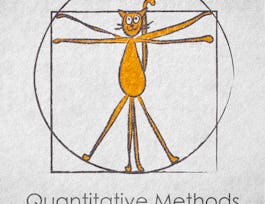In this course you will be introduced to the basic ideas behind the qualitative research in social science. You will learn about data collection, description, analysis and interpretation in qualitative research. Qualitative research often involves an iterative process. We will focus on the ingredients required for this process: data collection and analysis.


Qualitative Research Methods
This course is part of Methods and Statistics in Social Sciences Specialization
Taught in English
Some content may not be translated

Instructor: Gerben Moerman
101,918 already enrolled
Included with 
Course
(1,268 reviews)
98%
Details to know

Add to your LinkedIn profile
3 quizzes
Course
(1,268 reviews)
98%
See how employees at top companies are mastering in-demand skills

Build your subject-matter expertise
- Learn new concepts from industry experts
- Gain a foundational understanding of a subject or tool
- Develop job-relevant skills with hands-on projects
- Earn a shareable career certificate


Earn a career certificate
Add this credential to your LinkedIn profile, resume, or CV
Share it on social media and in your performance review

There are 8 modules in this course
Welcome to the first week of the course. We start with an introduction, followed by two lessons on the Philosophy of Qualitative Research.
What's included
8 videos12 readings1 peer review
In the first module we discussed the philosophy of qualitative research, explaining some basic notions and general philosophical approaches. In this second module we'll discuss observation as an important method within qualitative research. What types of observation are there? How do we observe? And how do we analyse and describe our data?
What's included
9 videos10 readings1 peer review
What makes qualitative research 'good' is a rather difficult question. Different criteria are suggested, but within the field of qualitative research there is not much agreement on these criteria. However, there is quite some agreement on what good practices of qualitative research are. In this module we will start in lesson 1 with a discussion of good practices of qualitative research.
What's included
9 videos9 readings2 quizzes
In this module we'll look at what a qualitative interview entails by trying to define it and by discussing different forms of interviewing behaviour.
What's included
7 videos9 readings1 peer review
In previous modules we discussed how you should observe a social situation or conduct a qualitative interview. Now we will focus on what to do with your data, by discussing qualitative analysis. In this module you will try to do a qualitative analysis by interpreting your observed data and try to code it.
What's included
6 videos10 readings1 peer review
In this module I will discuss ideas on writing in qualitative research, I will discuss mixing methods and talk about the ethical issues you should consider.
What's included
7 videos12 readings1 peer review
In this module there's no new material. The only requirement in this module is that you finish up the final peer review assignment.
What's included
1 reading
This is the final module, where you can apply everything you've learned up until now in the final exam. Please note that you can only take the final exam once every day, so make sure you are fully prepared to take the test. Please follow the honor code and do not communicate or confer with others taking this exam. Good luck! Once you've taken the exam, please consider doing the other courses in our specialisation track. I hope it was an enjoyable experience. If it was, please consider joining in with the Massive Open Online Research by my colleague Christian Bröer. Thanks for all your hard work, feedback and interpretations, the course team and your fellow learners really appreciate it!
What's included
1 quiz
Instructor

Offered by
Recommended if you're interested in Governance and Society

University of Amsterdam

University of Amsterdam

University of Amsterdam

Emory University
Why people choose Coursera for their career




Learner reviews
Showing 3 of 1268
1,268 reviews
- 5 stars
73.12%
- 4 stars
18.75%
- 3 stars
4.17%
- 2 stars
2.28%
- 1 star
1.65%

Open new doors with Coursera Plus
Unlimited access to 7,000+ world-class courses, hands-on projects, and job-ready certificate programs - all included in your subscription
Advance your career with an online degree
Earn a degree from world-class universities - 100% online
Join over 3,400 global companies that choose Coursera for Business
Upskill your employees to excel in the digital economy
Frequently asked questions
Access to lectures and assignments depends on your type of enrollment. If you take a course in audit mode, you will be able to see most course materials for free. To access graded assignments and to earn a Certificate, you will need to purchase the Certificate experience, during or after your audit. If you don't see the audit option:
The course may not offer an audit option. You can try a Free Trial instead, or apply for Financial Aid.
The course may offer 'Full Course, No Certificate' instead. This option lets you see all course materials, submit required assessments, and get a final grade. This also means that you will not be able to purchase a Certificate experience.
When you enroll in the course, you get access to all of the courses in the Specialization, and you earn a certificate when you complete the work. Your electronic Certificate will be added to your Accomplishments page - from there, you can print your Certificate or add it to your LinkedIn profile. If you only want to read and view the course content, you can audit the course for free.
If you subscribed, you get a 7-day free trial during which you can cancel at no penalty. After that, we don’t give refunds, but you can cancel your subscription at any time. See our full refund policy.

